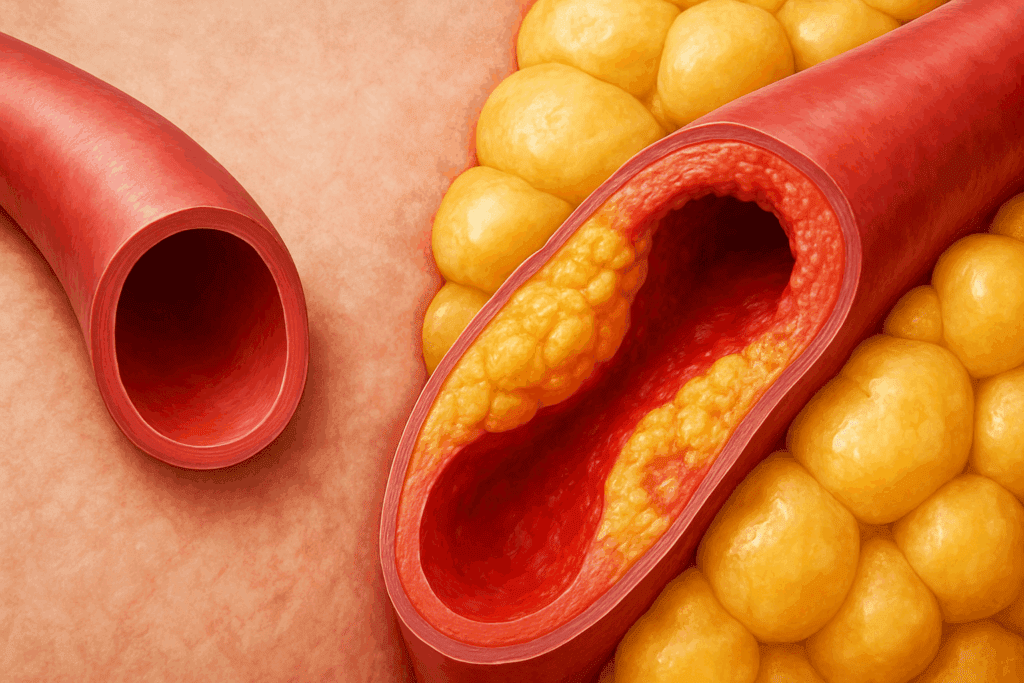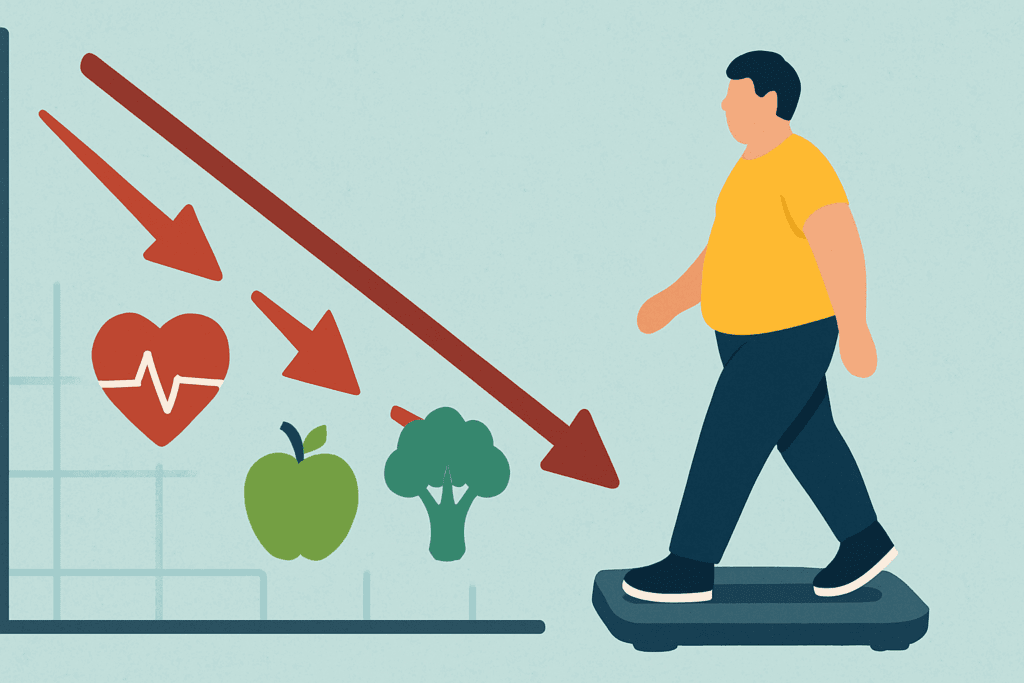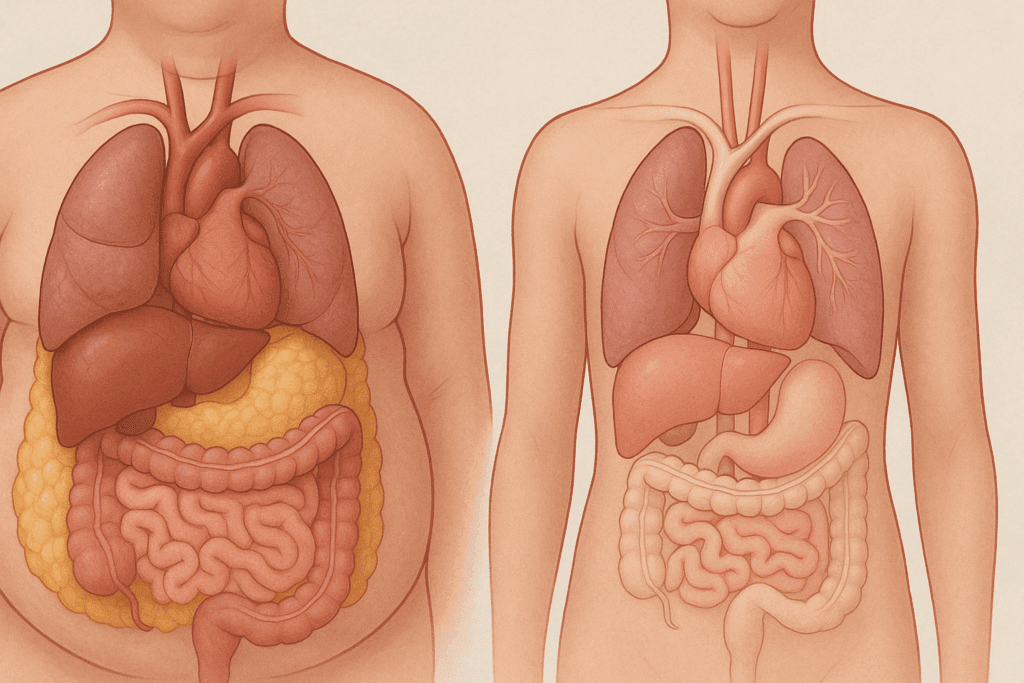High blood pressure—often dubbed the “silent killer”—remains one of the most prevalent and dangerous health challenges globally. Its elusive symptoms often escape notice until serious complications arise, such as heart attack, stroke, or kidney damage. For millions, managing blood pressure is a lifelong concern, leading to an ongoing search for natural, sustainable, and evidence-backed methods to bring those numbers down. Among the most commonly recommended strategies is weight loss. But can losing weight lower blood pressure in a meaningful, lasting way? And if so, how much weight loss is needed to make a measurable difference?
You may also like: Expert-Backed Weight Loss Tips for a Healthier Lifestyle: What You Need to Know for Long-Term Weight Control and Wellness
The science has evolved significantly in recent decades, allowing researchers to explore not only whether weight loss blood pressure improvements exist, but also why they occur. Understanding these mechanisms is critical not only for patients seeking alternatives to medication, but for healthcare professionals aiming to deliver the most effective interventions. In this comprehensive guide, we will examine the clinical evidence, physiological mechanisms, and practical strategies that connect weight loss to lower blood pressure. By the end, you’ll have a clearer grasp of how lifestyle changes influence cardiovascular health—and whether weight loss could be the key to lowering your blood pressure naturally.

Understanding the Link Between Body Weight and Blood Pressure
To appreciate the effect of weight loss on blood pressure, it’s essential to first understand how excess weight contributes to hypertension. Carrying excess body fat, especially around the abdomen, places a significant burden on the heart and vascular system. Fat cells are biologically active and release hormones and inflammatory substances that interfere with normal blood vessel function. This disruption can lead to increased resistance in the arteries—a major contributor to elevated blood pressure.
In addition to mechanical and hormonal effects, obesity also influences insulin resistance, sympathetic nervous system activity, and kidney function, all of which play roles in blood pressure regulation. This explains why overweight individuals are more likely to develop hypertension and why even moderate reductions in body weight can translate into meaningful cardiovascular benefits. Indeed, clinical data consistently show that losing just 5% to 10% of one’s body weight can yield measurable improvements in blood pressure readings. So, the question “does losing weight lower blood pressure?” is not only valid but medically significant.

What the Research Shows: Weight Loss as a Proven Strategy for Reducing Hypertension
A growing body of scientific evidence supports the connection between weight loss and blood pressure reduction. Numerous randomized controlled trials and large-scale cohort studies have consistently demonstrated that intentional weight loss is associated with both systolic and diastolic blood pressure improvements. In fact, for every kilogram (approximately 2.2 pounds) of weight lost, systolic blood pressure may decrease by about 1 mmHg—a modest but clinically meaningful improvement, especially when sustained over time.
A study published in The Lancet analyzed the effects of lifestyle modification programs and found that individuals who participated in weight loss interventions saw consistent reductions in blood pressure, independent of other changes like sodium intake or physical activity levels. This suggests that weight loss itself, rather than a confounding lifestyle variable, plays a direct role in lowering blood pressure. When healthcare providers are asked, “can losing weight reduce blood pressure in the long term?” their answer increasingly relies on this kind of high-quality, peer-reviewed evidence.
Moreover, a meta-analysis in the journal Hypertension showed that weight loss interventions lasting more than 12 weeks were particularly effective, with participants experiencing average systolic blood pressure reductions of 5 mmHg or more. This is comparable to some first-line antihypertensive medications, highlighting the therapeutic potential of lifestyle changes. Importantly, the benefits were most pronounced in individuals with higher baseline blood pressure levels, making weight loss a critical strategy for those with stage 1 or stage 2 hypertension.
How Much Weight Loss Is Needed to See Results?
While the correlation between weight loss and improved blood pressure is well established, one of the most frequently asked questions is how much weight loss is necessary to yield noticeable improvements. Fortunately, the answer is encouraging. Research indicates that even a relatively modest amount of weight loss—around 5% to 10% of body weight—can lead to significant health gains. For example, a person weighing 200 pounds may begin to see blood pressure improvements after losing as little as 10 to 20 pounds.
This gradual, sustainable approach aligns with long-term health goals and avoids the pitfalls of crash diets or extreme regimens. The improvements in blood pressure are often incremental, yet consistently positive. More importantly, this kind of weight reduction is often associated with other benefits, including better cholesterol profiles, improved glucose control, and enhanced physical mobility.
So when people ask, “will losing weight lower blood pressure enough to get off medications?” the answer is complex but hopeful. While weight loss alone may not eliminate the need for antihypertensive drugs in all individuals, it often reduces the dosage required and improves overall health outcomes. In some cases, particularly in early-stage hypertension, lifestyle changes alone—including weight loss—can restore normal blood pressure without pharmacological intervention.

Why Weight Loss Helps: The Underlying Physiological Mechanisms
The physiological mechanisms behind why weight loss lowers blood pressure are multifaceted and interconnected. One of the primary explanations lies in the reduction of vascular resistance. Excess fat, especially visceral fat around the organs, produces inflammatory cytokines that impair the flexibility of blood vessels. This stiffening of arteries increases the force required to pump blood, which elevates systolic pressure. Losing weight reduces the inflammatory load, allowing vessels to become more elastic and responsive.
Another major factor is the effect on insulin sensitivity. Obesity is closely linked to insulin resistance, which promotes sodium retention and increases sympathetic nervous system activity—both of which elevate blood pressure. As individuals lose weight, insulin sensitivity improves, leading to better regulation of sodium and fluid balance. This alone can contribute to measurable reductions in blood pressure readings.
Additionally, weight loss reduces the workload on the heart. With a smaller body mass to support, the heart doesn’t need to pump as hard or as frequently to circulate blood effectively. Over time, this can lead to a decrease in both resting heart rate and baseline blood pressure. All these physiological changes answer the question “does weight loss decrease blood pressure?” with a confident and science-backed yes.

Dietary Changes That Support Weight Loss and Blood Pressure Control
Weight loss and blood pressure regulation are not just about calories in versus calories out. The quality of the food consumed plays a major role in cardiovascular outcomes. Diets rich in fruits, vegetables, lean proteins, and whole grains provide not only fewer calories but also essential nutrients like potassium, magnesium, and fiber, all of which support heart health. On the other hand, diets high in processed foods, refined sugars, and sodium can exacerbate hypertension regardless of weight.
One evidence-based approach is the DASH (Dietary Approaches to Stop Hypertension) diet. This dietary pattern emphasizes foods that naturally lower blood pressure while promoting gradual weight loss. Clinical trials have shown that adherence to the DASH diet results in significant reductions in systolic and diastolic blood pressure, particularly when paired with weight management strategies. Notably, individuals often report improved energy levels and digestion when following this eating plan, making it easier to sustain over time.
A Mediterranean-style diet, rich in healthy fats from olive oil, nuts, and fish, also supports weight loss and cardiovascular health. The anti-inflammatory properties of these diets enhance endothelial function—the ability of blood vessels to dilate properly—which contributes to long-term blood pressure control. Thus, for those wondering, “can losing weight lower blood pressure through better diet alone?” the answer is that food quality and nutrient composition play a central, synergistic role.

The Role of Physical Activity in Weight Loss and Hypertension Prevention
Although diet tends to receive the most attention in discussions about weight loss, physical activity is an equally important component—especially when the goal is long-term blood pressure control. Regular aerobic exercise such as brisk walking, cycling, swimming, or jogging helps burn calories, improve circulation, and strengthen the heart. These benefits translate into more efficient cardiovascular function and reduced resting blood pressure levels over time.
Physical activity also promotes better hormone regulation and supports metabolic flexibility. Exercise enhances the body’s ability to manage blood sugar and insulin, both of which influence sodium retention and arterial pressure. Resistance training, while not as frequently emphasized, also plays a role in overall weight loss and cardiovascular health. It helps preserve lean muscle mass, which boosts resting metabolism and improves physical function, particularly as people age.
Consistent movement also has psychological benefits. Reducing stress through physical activity helps lower cortisol levels—a hormone that, when elevated chronically, can raise blood pressure. So when people ask, “can losing weight reduce blood pressure even if it’s only a small amount?” it’s important to emphasize that the combination of weight loss and improved cardiovascular conditioning, even in modest amounts, can yield substantial health benefits.
When Weight Loss May Not Be Enough: The Role of Genetics and Comorbidities
While losing weight lowers blood pressure for many, it is not a universal remedy. Some individuals may not see the expected blood pressure drop despite significant weight loss. This variation can often be explained by genetic predispositions, medication interactions, or underlying medical conditions such as kidney disease, thyroid dysfunction, or sleep apnea. In these cases, weight loss should still be pursued for its broad health benefits, but blood pressure management may require a more comprehensive, individualized approach.
Certain medications, such as corticosteroids or oral contraceptives, can also influence blood pressure independently of weight. Therefore, anyone attempting to manage hypertension through lifestyle alone should consult with a healthcare provider to rule out additional contributing factors. This also underscores the importance of regular blood pressure monitoring, as silent changes can occur even in individuals who feel healthy.
Moreover, it’s important to recognize that body composition matters just as much as overall weight. Two individuals with the same body mass index (BMI) may have very different fat distributions and metabolic risks. Visceral fat, in particular, is far more damaging than subcutaneous fat when it comes to hypertension. So, even if the scale doesn’t shift dramatically, improvements in waist circumference or body fat percentage can still signal progress toward better blood pressure control.
Clinical Guidance and Expert Recommendations for Patients
Leading health organizations including the American Heart Association and the Centers for Disease Control and Prevention consistently emphasize weight loss as a first-line strategy for preventing and managing high blood pressure. These recommendations are rooted in decades of clinical evidence and are tailored to reduce the need for long-term medication where possible.
Healthcare providers often advise patients to begin with manageable goals—such as losing 1 to 2 pounds per week—and to focus on sustainable behavior changes rather than rapid fixes. Structured weight management programs, often supervised by registered dietitians or primary care physicians, have been shown to improve adherence and produce longer-lasting results. These programs typically combine dietary counseling, physical activity guidance, and behavioral support to help patients stay on track.
When discussing treatment options, many physicians are asked, “does losing weight lower blood pressure enough to avoid lifelong medication?” While responses vary based on the individual’s condition and response, clinicians increasingly agree that weight loss is one of the few interventions with potential disease-reversing effects, particularly when hypertension is caught in its early stages.

Long-Term Outcomes: What Happens When Weight Is Regained?
One concern patients frequently raise is the potential for blood pressure to return to high levels if weight is regained. Unfortunately, the answer is yes—regaining weight often results in the return of elevated blood pressure and other metabolic complications. This highlights the importance of maintenance strategies and long-term commitment to a healthy lifestyle.
Long-term studies suggest that individuals who maintain weight loss over multiple years continue to enjoy sustained blood pressure benefits. Strategies for maintenance include continued physical activity, routine self-monitoring, support from healthcare professionals, and psychological tools to manage stress and prevent emotional eating. Building these habits not only helps keep weight off but also reinforces a cardiovascular-protective lifestyle.
While setbacks are common, the key is not to view them as failures but as opportunities for course correction. The journey toward blood pressure improvement through weight loss is often non-linear, but every step taken in the right direction contributes to a healthier long-term outcome.
Frequently Asked Questions (FAQ): Weight Loss and Blood Pressure
1. Can losing weight lower blood pressure even if I don’t reach my goal weight?
Yes, even partial weight loss can yield meaningful health benefits, particularly when it comes to blood pressure. Studies have shown that losing as little as 5% of your body weight can help reduce blood vessel resistance and decrease pressure on the heart, leading to better regulation of blood flow. In fact, one of the most reassuring answers to “can losing weight lower blood pressure” is that it doesn’t require drastic changes to start seeing results. Incremental progress—such as losing 10 to 15 pounds—can result in improved arterial function and reduced strain on the kidneys, both of which support lower blood pressure. While reaching your goal weight may enhance the benefits, initial progress still matters significantly for cardiovascular outcomes.
2. Does losing weight lower blood pressure in people who are not technically obese?
Absolutely. Blood pressure can still be elevated in individuals who are not classified as obese, particularly if they carry excess visceral fat around the abdomen. For those with normal or slightly elevated body mass index (BMI), losing even a few pounds can improve metabolic efficiency, enhance insulin sensitivity, and support vascular elasticity. The question isn’t solely about weight class but about the physiological changes that accompany weight loss. So, if you’re wondering “does losing weight lower blood pressure even when someone is just overweight or has central adiposity?”—the answer is yes. Even small reductions in fat percentage, especially around the midsection, can have an outsized effect on blood pressure control.
3. Will losing weight lower blood pressure in older adults as effectively as in younger people?
While age-related changes in arterial stiffness can complicate hypertension in older adults, weight loss still plays a significant role in reducing elevated blood pressure across age groups. In seniors, intentional weight reduction not only supports better cardiovascular function but also reduces the risk of comorbidities like osteoarthritis and Type 2 diabetes. Interestingly, research has shown that weight loss blood pressure benefits in older adults are often linked to improved renal function and reduced systemic inflammation. Therefore, when asking “will losing weight lower blood pressure in later life?”—the data suggest that age does not diminish the benefits. In fact, weight management in older populations may offer a greater cumulative impact by improving mobility, independence, and cardiovascular resilience simultaneously.
4. Can losing weight reduce blood pressure more effectively than medication in some cases?
In early or moderate cases of hypertension, lifestyle changes—particularly weight loss—can sometimes rival or even surpass medication in terms of effectiveness. Clinical trials have found that consistent weight reduction paired with dietary improvements can lead to systolic blood pressure drops of 5 to 10 mmHg, which mirrors the impact of common antihypertensive drugs. This doesn’t mean medication should be disregarded, but it does highlight the power of non-pharmacologic interventions. For patients wondering, “can losing weight reduce blood pressure enough to manage it without pills?” the answer depends on their starting point, genetics, and consistency with lifestyle changes. Many physicians now incorporate weight loss as the cornerstone of hypertension prevention plans, especially in patients hesitant to start long-term medication.
5. Why does weight loss have such a strong effect on blood pressure, beyond the obvious reasons?
The link between weight loss and blood pressure control goes beyond reduced body mass. Losing weight can influence dozens of biological pathways, including hormone regulation, vascular inflammation, and sympathetic nervous system activity. For example, fat cells secrete leptin and adipokines, which in excess contribute to endothelial dysfunction—a key driver of hypertension. So, does weight loss decrease blood pressure purely by reducing load on the heart? Not quite. It also rebalances hormonal signaling, improves the responsiveness of arteries to nitric oxide, and reduces oxidative stress, all of which help lower blood pressure naturally. These deeper mechanisms are why the benefits of weight loss extend well beyond what the scale shows.
6. Are there specific types of weight loss that are more effective for blood pressure reduction?
Yes, the quality of weight loss—meaning fat loss versus muscle loss—can influence blood pressure outcomes. Fat loss, especially visceral fat reduction, is more closely associated with improvements in blood pressure than overall weight reduction that includes muscle mass. Structured interventions that combine aerobic exercise with resistance training are often the most beneficial because they preserve lean tissue while targeting harmful fat stores. So, when evaluating whether weight loss blood pressure results will be meaningful, it’s important to consider how the weight is lost. Crash diets or extreme calorie deficits might reduce weight quickly but may not produce the same cardiovascular benefits as slow, sustainable fat loss supported by balanced nutrition and activity.
7. How long does it take for weight loss to impact blood pressure numbers?
While timelines vary by individual, many people begin to see changes in blood pressure within a few weeks of initiating a weight loss program—especially if it’s paired with reduced sodium intake and increased physical activity. Improvements in insulin sensitivity and endothelial function can begin shortly after modest weight reduction, often resulting in lower systolic and diastolic values by the one-month mark. That said, sustained progress tends to yield the most stable improvements. If you’re asking, “does weight loss decrease blood pressure immediately or gradually?”—the answer is typically gradual, though some individuals may experience early improvements. Consistency is key, and benefits tend to accumulate over time with adherence to lifestyle changes.
8. Does losing weight lower blood pressure even if genetics play a strong role in hypertension?
While genetics undeniably influence blood pressure, they do not negate the benefits of weight loss. Genetic predispositions may increase your baseline risk, but lifestyle factors can still significantly modify outcomes. Research in epigenetics has shown that weight loss can alter the expression of genes associated with inflammation, lipid metabolism, and vascular reactivity. This means that even if hypertension “runs in the family,” your actions can still shift the odds. If you’re asking “does losing weight lower blood pressure in people with inherited hypertension?”—the answer is yes, although the degree of benefit may vary. Lifestyle interventions remain essential, even for those with strong familial tendencies toward high blood pressure.
9. What if I’ve lost weight, but my blood pressure remains high—what should I consider next?
If you’ve already lost weight and your blood pressure hasn’t improved significantly, it’s time to evaluate additional factors. Sleep quality, stress levels, and hidden sources of dietary sodium are all common culprits that can sabotage blood pressure control, even in the context of weight loss. Additionally, underlying medical conditions such as primary aldosteronism or renal artery stenosis may need to be ruled out. It’s also possible that your salt sensitivity remains high or that medications are affecting your baseline pressure. In such cases, asking whether “can losing weight lower blood pressure on its own?” may not be the right frame—what’s needed is a comprehensive review of all contributing factors with a healthcare professional.
10. What are the long-term consequences of relying solely on weight loss for blood pressure management?
Relying solely on weight loss to manage blood pressure can be effective in some cases, especially for those with mild or prehypertensive readings. However, it’s important to monitor for potential plateaus or metabolic adaptations that can reduce the effectiveness of weight loss over time. Sustainable blood pressure management often requires a multi-pronged strategy, including regular check-ups, stress management, sleep hygiene, and possibly medication in more severe cases. The real question is not “will losing weight lower blood pressure forever?” but rather, “how can I maintain blood pressure control long term?” In that context, weight loss is a foundational tool, but not the only one. A holistic lifestyle plan that includes weight maintenance, exercise, and dietary balance offers the best chance for lasting cardiovascular health.
Final Thoughts: Why Weight Loss Matters for Blood Pressure and Beyond
In the modern era of personalized medicine and preventive care, understanding the connection between body weight and blood pressure is more critical than ever. The evidence is clear and compelling: weight loss can and often does lower blood pressure in meaningful ways. Whether someone is asking, “can losing weight lower blood pressure if I only lose a little?” or “does weight loss decrease blood pressure enough to make a difference?”, the answer lies in both the clinical data and the real-world stories of individuals who’ve seen measurable improvements through consistent effort.
While weight loss is not a cure-all, it remains one of the most powerful lifestyle tools available to reduce hypertension risk and improve overall cardiovascular health. It works through multiple pathways—reducing inflammation, improving insulin sensitivity, lowering vascular resistance, and relieving pressure on the heart. When paired with a balanced diet and regular exercise, even small amounts of weight loss can lead to lasting changes in blood pressure and broader wellness.
Ultimately, addressing hypertension through weight loss is not just about numbers on a scale or a blood pressure cuff. It’s about restoring balance, resilience, and confidence in one’s health journey. With the right support, knowledge, and commitment, weight loss can be a transformative force in reducing high blood pressure and reclaiming control over one’s long-term well-being.
Further Reading:
Weight Loss and Blood Pressure Control (Pro)
6 simple tips to reduce your blood pressure
New weight loss medication may help lower blood pressure in adults with obesity


